A world of opportunity
Sharon Bignell's studies in international relations took her from the Australian Embassy in Tokyo to leading Australia’s presence at Expo 2025 Osaka.
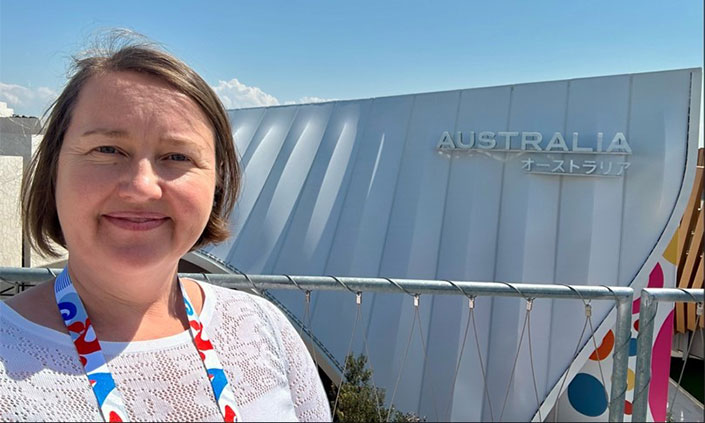
"In a fragmented international environment, with so many global issues and challenges, cooperation across borders is increasingly important – and also makes a degree in international relations especially relevant," says Sharon Bignell, who graduated from Macquarie University with a Master of International Relations in 2007.
Having completed an undergraduate degree in business and Japanese, Ms Bignell was working for the Japanese government in 2005 after completing the JET Program but aspired to work for the Australian government in the future.
"A friend of mine in Japan was considering a master's by distance from Macquarie University and recommended the Master of International Relations. I decided to enrol.
"Studying externally was very different back then – each semester, I’d receive a pack in the mail from the University, which had CD-ROMs and course readings in it, and a printed copy of the course outline. There wasn’t a library nearby where I could borrow reference books or articles, so I had to order books on Amazon US or visit the UN University Library in Tokyo.
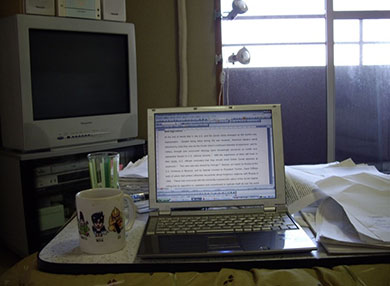
"Juggling work and study was hard, to be honest, and it felt a little lonely at times, but the tutors at Macquarie were very supportive – I remember sending them lots of emails about things I didn’t understand." says Ms Bignell fondly.
Still, it was worth it – her masters has been highly regarded in every position she has applied for since, in Japan, the UK and Australia.
"It has been an asset and a point of difference. I’m not just seen as someone who knows how to market and promote, but someone who has a deeper understanding of the global environment in which we live and knows how to work with other countries and cultures to achieve common goals."
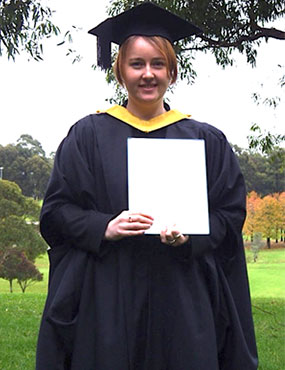
It’s a skillset that’s critical to her current role as Assistant Director for Partnerships, Programs and Sponsorships with the Osaka Expo Taskforce at the Department of Foreign Affairs and Trade (DFAT), overseeing partnerships and delegation visits for the Australia Pavilion at World Expo 2025 Osaka.
Running from 13 April – 13 October 2025, the Expo is expected to attract more than 28 million visitors, including over 3.5 million international guests. Australia is one of around 160 participating countries and regions, alongside 25 international organisations.
"The Australia Pavilion is a unique opportunity to showcase the best of Australian business, innovation, exports, sport and culture," says Ms Bignell.
Alongside other Commonwealth agencies, state and territory governments, and around 30 companies supporting the Pavilion, she spent a year in Canberra preparing for the Expo, engaging sponsors and planning invitation-only business events.
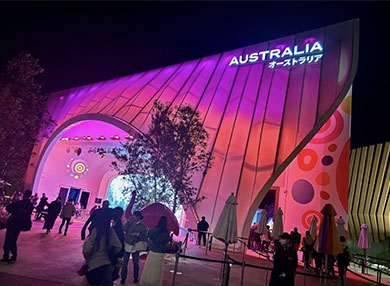
In April this year, Ms Bignell moved to Osaka to be on the ground at the Pavilion, building and managing partnerships, delivering strategic benefits to supporters, and ensuring a high level of hospitality.
"If you’re a Japanese company working with an Australian company and they invite you to the Australia Pavilion for a special event, it’s seen as quite an honour," she explains.
Ms Bignell’s expertise in protocol, event management and high-level diplomacy was honed while working at the Australian Embassy in Tokyo after her masters degree – and during a critical period in Australia–Japan relations. As she explains, "My degree was highly regarded by the selection committee at the Embassy, and it was the first time I’d had the opportunity to work for the Australian government, which I was proud to do.
"I was looking after many of the high-level visits, including when Prime Minister Julia Gillard visited after the earthquake and tsunami in 2011, which was followed by the Fukushima nuclear disaster – she was the first international leader to visit the disaster-affected areas to express her condolences and pledge support. It was fascinating work."
Ms Bignell had long held an interest in Japan – ever since primary school, in fact, when intrigued by their language and lunch boxes, she made friends with some Japanese students in class. She then chose Japanese as an elective in Year 7, explaining: "It was just so different to the European languages, with characters I couldn’t read. My parents also encouraged me – back then, Japan was a rising star, and everyone thought they’d get a good job if they could speak Japanese."
It couldn’t have been better advice for Ms Bignell, who continued to follow her interest in Japan with an exchange to Okayama for six months in Year 10, where she mastered everyday conversation and started to feel confident in her language abilities. Next, she chose a double degree in business and Japanese at the University of Technology Sydney (UTS), which offered a one-year exchange program in Japan, which she undertook in Sapporo.
It was during her time at UTS that Ms Bignell was first introduced to Macquarie University.
"I was able to do some of my Japanese subjects at Macquarie as part of my degree – it was more academic than the business-focused language learning at UTS and broadened my skills in Japanese."
After graduating, Ms Bignell pursued international opportunities, returning to Japan.
"After three years in Mie Prefecture as a Coordinator for International Relations on the Japanese government’s JET Program, I worked for the Japanese government organisation that manages the program across Japan as a Program Coordinator, running conferences, Japanese language courses and an alumni program. While on the JET Program, I also volunteered at the 2005 World Expo in Aichi, so it’s a full-circle moment returning 20 years later for this expo."
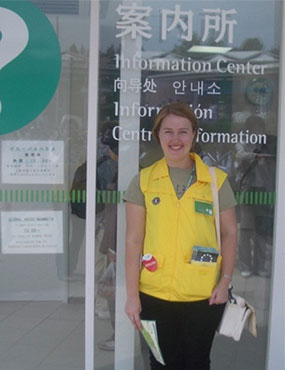
After ten years overseas – including her time at the Embassy in Tokyo and a stint in London with her Japanese husband – Ms Bignell returned to Australia in 2013 to take up a protocol-related role in the G20 Taskforce at the Department of Prime Minister and Cabinet in Brisbane. Senior roles in the university sector followed, where she continued to visit Japan regularly to undertake promotions and develop new partnerships, before she eventually returned to Osaka in January 2021 as Trade Commissioner and Consul with the Australian Trade and Investment Commission (Austrade).
"I was assisting Australians in Japan by providing consular services, helping Australian businesses – including education providers – to develop partnerships, and facilitating broader trade connections between Australian and Japanese companies. With borders still closed, it was challenging when I first arrived, but the team achieved a considerable amount despite the circumstances."
It was during this time that Ms Bignell connected with key stakeholders for the upcoming World Expo 2025 in Osaka, leading to her current appointment with the Expo Taskforce. Surprisingly, despite all this experience, she is still occasionally taken for a tourist in Japan – that is, until they realise she has spent most of her career there and is fluent in Japanese.
"My language skills are now at a very high level,’ she says. ‘I recently passed DFAT’s language proficiency test with the highest score a non-native speaker can achieve – speaking Japanese has definitely been an asset in my career."
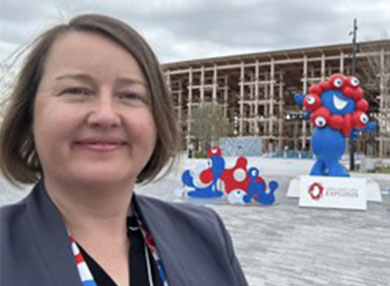
Sharon Bignell's bio
Sharon Bignell holds a Master of International Relations (2007) from Macquarie University. With more than 15 years of international experience, she has built a career spanning business development, marketing, event management, protocol and project leadership across Australia, Japan and the UK.
Fluent in Japanese and deeply immersed in Japanese culture, having lived there for almost 15 years, Ms Bignell has held pivotal roles in education, trade and diplomacy, including as Trade Commissioner and Consul in Osaka with the Australian Trade and Investment Commission (Austrade), and now as Assistant Director for Partnerships, Programs and Sponsorships with the Osaka Expo Taskforce at the Department of Foreign Affairs and Trade.
Ms Bignell’s expertise in forging partnerships, managing high-level diplomatic events and navigating cross-cultural environments has made her a respected leader in international engagement and a key figure in shaping Australia’s presence at World Expo 2025 Osaka. She also holds a Bachelor of Business/Bachelor of Arts (2001) from the University of Technology Sydney, majoring in international studies, international marketing and Japanese.